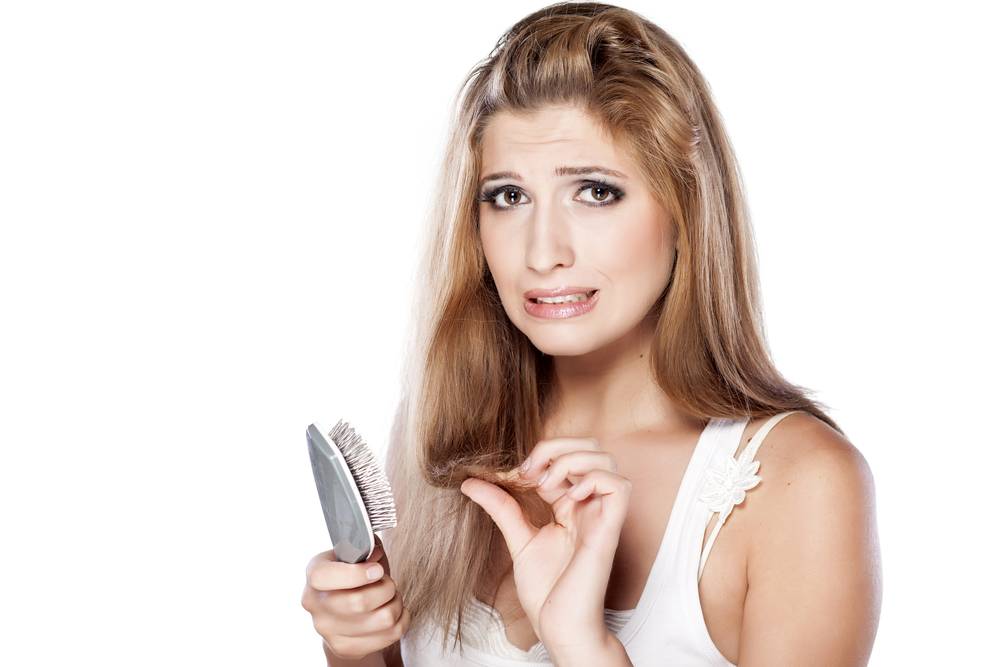Hair can be described as a barometer of physical condition because hair cells are some of the fastest growing part in our body. When the body is in catastrophe, the hair cells can shut down to redirect energy elsewhere. The types of situations that can cause hair loss include hormonal misbalance, nutrient deficiencies and reduced diet, a variety of medications, surgery, and many medical conditions, but noticeably thyroid disease. Find out here about hair loss treatment, hair fall treatment and baldness. Thyroid problem is a one of the most common hair loss causes in women.
Hair loss and thyroid disease
Severe and prolonged hypothyroidism and hyperthyroidism can cause hair loss and baldness. The loss is defuse and involves the entire scalp area rather than discrete areas. The hair appears consistently light. Treatment of hair fall is usual with successful treatment of the thyroid disorder, though it will take several months and maybe incomplete. It is unusual for mild hypothyroidism and hyperthyroidism, or short-lived thyroid problems to cause hair loss.
How exactly does thyroid cause hair fall and baldness
Also Read:Hair loss after pregnancy and childbirth
Your hair follicles pursue a natural cycle of hair growth and inactive phases. At any given time, most of your hair is growing while only a small portion of it is resting. But when body changes throw off that cycle, then too much hair rests at one time and does not grow enough, ensuing in unwanted hair loss, baldness and hair fall.
Many medical conditions can cause hair fall, but thyroid disease is a common culprit. Thyroid problems include both an underactive thyroid gland and an overactive thyroid gland. Because hair growth depends on the proper functioning of thyroid hormone. Abnormal levels of thyroid hormone produced by this gland can affect hair loss, hair fall or baldness along with many side effects. When there is too much of thyroid hormone your hair becomes fine, with thinning of hair all over your head causing hair fall. When there is too little of this hormone, there can be hair loss, not just on the scalp, but also anywhere on the body.
Treatment of hair loss, baldness related to your thyroid disease/ to stop excessive hair fall
Get an evaluation- to deal with hair loss you should consult with dermatologist or a hair loss expert physician to know the causes as hair loss can happen due to infection also.
Be patient
If you are experiencing hair loss and are just starting treatment for a hypothyroid and hyperthyroid condition it is likely that you notice the hair loss will slow down and eventually stop, once hormone levels are stabilized and in the usual range. This may take a few months.
Make sure it’s not your thyroid drug
Many doctors don’t know this, even though it is stated as side effect in the synthroid patient literature, so don’t be surprised if your doctor is not aware of this.
Consult a doctor:
You can consult a dermatologist to work on drug treatment, including scalp injection and other hair loss treatments that can help non-thyroid related hair loss.
Also Read:Avoid stress to prevent loss problem
Vitamin C and E
These vitamins don’t directly cause hair growth, but they can be contributing factors for anyone looking for the enhancement in the treatment of hair loss, treatment of hair fall, baldness in thyroidism.
Certain amino acids
lysine and l-arginine can stimulate hair growth. You can choose to take a nutritional supplement or can obtain these amino acids by eating foods such as poultry, fish and legumes.
Conclusion:
Treatment of hair loss in thyroidism is available just remember that there could be other causes of hair loss which might be a factor and thus one can’t just assume that the thyroid condition itself is responsible for the hair loss.


